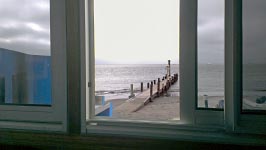Walvisbay
202a 2014 travel journal Swakopmund
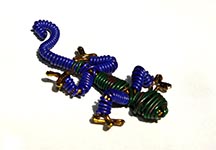 local art made from electrical wire
local art made from electrical wire©: 2014 Robert Schilder
tags: #Swakopmund
-photographs are available from: robertschilder@gmail.com
, ,
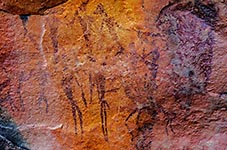 "The White Lady is a rock painting, located on a panel, also depicting other art work, on a small rock overhang, deep within Brandberg Mountain, Erongo, Namibia"
"The White Lady is a rock painting, located on a panel, also depicting other art work, on a small rock overhang, deep within Brandberg Mountain, Erongo, Namibia"
source: Wikipedia
"The Brandberg is a neo-granitic moutain standing on a foundation of basalt, indurated schist and quartzite, and is situated 70 miles from Cape Cross where the Portuguese ships of Diego Cam anchored in 1485. These mariners erected one of their stone crosses, making no effort to explore the interior and seeing none of the inhabitants. The Brandberg lies 250 miles by car northwest of Windhoek, the capital of South-West Africa, near the edge of the high sub-desertic plateau of meagre grass plains savannas, withe no permanent waterholes, in a region where there is gold, alluvial tin and copper. Vast Old Palaeolithic and Middle Stone Age stations lie along the base of this range in the parts where there are sheets of granitic gravels, indurated schist and white vein quartz. This shows that the present desertic onditions have not always existed. The late Middle Stone Age and Late Stone Age sites are even more frequent below the granitic rocks shelters near the temporary or seasonal waterholes, round wich there are sometimes abundant remains of Hottentot pottery."
source: Henri Breuil. The white lady of Brandberg, South-West Africa, her companions and her guards. The South African Archaeological Bulletin, 1948, III (9), pp.1-13
"A common misconception is that South African rock art depicts exotic 'foreigners'. People who believe the Bushmen to be mentally incapable of producing art, naturally have to find alternative artists to account for the immense quantity of rock art in southern Africa, and they seek evidence in the art itself. One of the most influential figures in the study of prehistoric art in Europe and elsewhere, the Abbe Henri Breuil, was responsible for some gross errors that are still encountered today. He believed that he could identify depictions of Minoans, Phoenicians and other Mediterranean people in southern African rock art. The painting that gave rise to his most spectacular blunder, the so-called White Lady of the Brandberg, has become a persistent legend, even enjoying the doubtful distinction of appearing in one of Erich von Daniken's books where the author implies that it depicts a being from outer space - the ultimate in exoticism. The story of its discovery and fame illustrates some disastrous trends that have damaged rock art research and discredited it in the eyes of professional archaeologists and other interested people."
read on: Adapted from Images of Power: Understanding Bushman Rock Art by J.D. Lewis-Williams and T.A. Dowson.http://yggtwo.tripod.com/whitelady.htm
©: picture: Jimfbleak Wikipedia
, , tags: #Swakopmund Museum #White lady of the Brandberg
202b 2014 travel journal -White Lady of the Brandberg
 "The White Lady is a rock painting, located on a panel, also depicting other art work, on a small rock overhang, deep within Brandberg Mountain, Erongo, Namibia"
"The White Lady is a rock painting, located on a panel, also depicting other art work, on a small rock overhang, deep within Brandberg Mountain, Erongo, Namibia"source: Wikipedia
"The Brandberg is a neo-granitic moutain standing on a foundation of basalt, indurated schist and quartzite, and is situated 70 miles from Cape Cross where the Portuguese ships of Diego Cam anchored in 1485. These mariners erected one of their stone crosses, making no effort to explore the interior and seeing none of the inhabitants. The Brandberg lies 250 miles by car northwest of Windhoek, the capital of South-West Africa, near the edge of the high sub-desertic plateau of meagre grass plains savannas, withe no permanent waterholes, in a region where there is gold, alluvial tin and copper. Vast Old Palaeolithic and Middle Stone Age stations lie along the base of this range in the parts where there are sheets of granitic gravels, indurated schist and white vein quartz. This shows that the present desertic onditions have not always existed. The late Middle Stone Age and Late Stone Age sites are even more frequent below the granitic rocks shelters near the temporary or seasonal waterholes, round wich there are sometimes abundant remains of Hottentot pottery."
source: Henri Breuil. The white lady of Brandberg, South-West Africa, her companions and her guards. The South African Archaeological Bulletin, 1948, III (9), pp.1-13
"A common misconception is that South African rock art depicts exotic 'foreigners'. People who believe the Bushmen to be mentally incapable of producing art, naturally have to find alternative artists to account for the immense quantity of rock art in southern Africa, and they seek evidence in the art itself. One of the most influential figures in the study of prehistoric art in Europe and elsewhere, the Abbe Henri Breuil, was responsible for some gross errors that are still encountered today. He believed that he could identify depictions of Minoans, Phoenicians and other Mediterranean people in southern African rock art. The painting that gave rise to his most spectacular blunder, the so-called White Lady of the Brandberg, has become a persistent legend, even enjoying the doubtful distinction of appearing in one of Erich von Daniken's books where the author implies that it depicts a being from outer space - the ultimate in exoticism. The story of its discovery and fame illustrates some disastrous trends that have damaged rock art research and discredited it in the eyes of professional archaeologists and other interested people."
read on: Adapted from Images of Power: Understanding Bushman Rock Art by J.D. Lewis-Williams and T.A. Dowson.http://yggtwo.tripod.com/whitelady.htm
©: picture: Jimfbleak Wikipedia
, , tags: #Swakopmund Museum #White lady of the Brandberg
202c 2014 travel journal -Swakopmund Museum
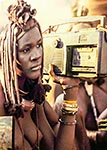 "The Herero and the Owambo, no longer just poorly paid migrant labourers, represent the backbone of modern Namibia. Their cousins, the Himba, still wear traditional clothing in the remote and wild Kaokoveld; they are the last nomadic, herding peoples in southern Africa. The oldest inhabitants of Namibia are the Bushmen, or San. Today, Botswana and Namibia are the last refuge of these ancient and fragile tribes, struggling to keep a sense of identity in the modern world. Namibia are the last refuge of these ancient and fragile tribes, struggling to keep a sense of identity in the modern world."
"The Herero and the Owambo, no longer just poorly paid migrant labourers, represent the backbone of modern Namibia. Their cousins, the Himba, still wear traditional clothing in the remote and wild Kaokoveld; they are the last nomadic, herding peoples in southern Africa. The oldest inhabitants of Namibia are the Bushmen, or San. Today, Botswana and Namibia are the last refuge of these ancient and fragile tribes, struggling to keep a sense of identity in the modern world. Namibia are the last refuge of these ancient and fragile tribes, struggling to keep a sense of identity in the modern world."from: www.footprinttravelguides.com
©: 2014 Robert Schilder (picture taken in the Swakopmund Museum)
tags: #Swakopmund museum #Himba
202d 2014 travel journal -Swakopmund Museum
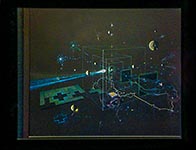 3-D vision and Stereoscopy with a Brewster stereoscope
3-D vision and Stereoscopy with a Brewster stereoscopeKoos van Ellinckhuijzen is a Namibian artist. He is most noted for his work on Namibian and South West African postage stamps. He has exhibited in both Namibia and the US. Adelheid Lilienthal, in Art in Namibia has noted the scientific accuracy of his designs, their clean lines and his use of watercolor techniques (from Wikipedia)
link: www.pinterest.com
©: 2014 Robert Schilder (picture taken in the Swakopmund Museum)
tags: #Swakopmund Museum
, ,
 typical Swakopmund architecture
typical Swakopmund architecture
©: 2014 Robert Schilder
tags: #Swakopmund #architecture #Namibia
202e 2014 travel journal -Swakopmund
 typical Swakopmund architecture
typical Swakopmund architecture©: 2014 Robert Schilder
tags: #Swakopmund #architecture #Namibia
202f , bsp;2014 travel journal -Swakopmund Ocean view
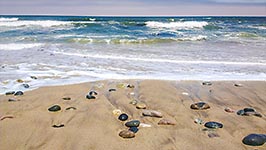 Ocean view
Ocean view©: 2014 Robert Schilder
tags: #Swakopmund #ocean #Namibia
203 2014 travel journal -Swakopmund
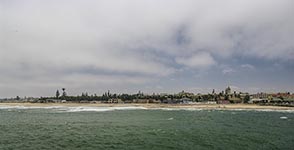 Swakopmund from the pier
Swakopmund from the pier"Surrounded on three sides by the arid Namib Desert and on the west side by the cold waters of the South Atlantic, Swakopmund is surely one of the most unusual and fascinating colonial towns in the whole of Africa. In a period of a little more than 25 years the German Imperial Government built a succession of extravagant buildings, which today represent one of the best-preserved collections of German colonial architecture still standing. When approached from the desert, especially during the morning fog, the turrets, towers and pastel-coloured buildings on the skyline appear as a hazy mirage, and the quirky town comes as quite as surprise on the barren coastline."
text from: www.footprinttravelguides.com
©: 2014 Robert Schilder
tags: #Swakopmund #Namibia
203a 2014 travel journal -Swakopmund Museum
 "Die Helden des Burenkrieges" (the Heroes of the Boer War) depicting Chris. de Wet & M.T.Steijn
"Die Helden des Burenkrieges" (the Heroes of the Boer War) depicting Chris. de Wet & M.T.SteijnIs this the same as the following item?:
When you know more about this artwork, please let me know (robertschilder&gmail.com)
Musical Box ?
DIE HELDEN DES BURENKRIEGES n.p.: circa 1902, Dark wood, 48 by 66cm, depth: 12cm, surround with glass front, recessed satin draped stage with a highly decorated foliate proscenium to enclose painted porcelain figures of Gens. De La Rey and Botha standing on titled base. Both with rifles and bandoliers. See Oosthuizen, P. - Boer War Memorabilia, The Collectors´ Auction guide p436: R6 000 - R8 000
www.stephanwelzandco.co.za
©:2014 Robert Schilder (picture taken in the Swakopmund Museum)
tags: #Swakopmund Museum #Boeren oorlog #Namibia
203b 2014 travel journal -Der Freiheitskampf der Buren
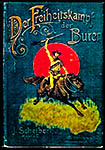 Scheibert J. Major z.D.
Scheibert J. Major z.D.Verlag von A. Schröder, Berlin W. 1902
©: www.zvab.com
see also: www.kaiserscross.com
tags: #Boeren oorlog #Namibia
198 2014 travel journal -Walvis bay
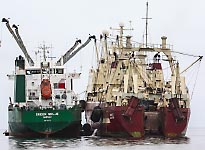 sv ´Heinaste´, a factory trawler and the´ Green Selje, a refrigerated cargo ship working from Walvisbay. Note the seals on the ramp.
sv ´Heinaste´, a factory trawler and the´ Green Selje, a refrigerated cargo ship working from Walvisbay. Note the seals on the ramp.©: Robert Schilder 2014
tags: #Walvisbay #Green Selje #Heinaste
198a 2014 travel journal -Walvis bay
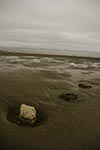 Walvis Bay scenery
Walvis Bay scenery©: Robert Schilder 2014
tags: #Walvisbay # #
198b 2014 travel journal -Walvis bay
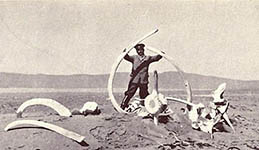 bones on the beach 'The destiny of Walfish Bay' - Mac, nald, William, 1875-1935
bones on the beach 'The destiny of Walfish Bay' - Mac, nald, William, 1875-1935©: PD, more on Pinterest
tags: #Walvisbay # #
199a 2014 travel journal -Walvisbay
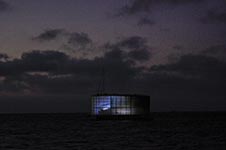 Wharf or workshop at sea near the Walvis Bay Yacht Club
Wharf or workshop at sea near the Walvis Bay Yacht Club©: Robert Schilder 2015
tags: #Walvisbay
